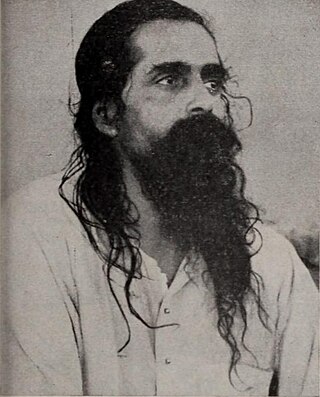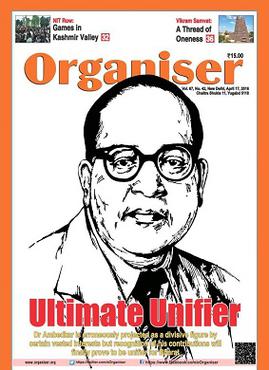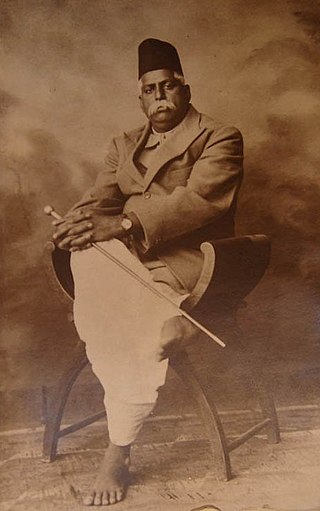
Rashtriya Swayamsevak Sangh is an Indian right-wing, Hindu nationalist volunteer paramilitary organisation. It is the progenitor and leader of a large body of organisations called the Sangh Parivar, which has developed a presence in all facets of Indian society and includes the Bharatiya Janata Party, the ruling political party under Narendra Modi, the 14th prime minister of India. Mohan Bhagwat has served as the Sarsanghchalak of the RSS since March 2009.

The Akhil Bharatiya Jana Sangh (abbreviated asBJS or JS, short name: Jan Sangh, was an Indian nationalist political party. This party was established on 21 October 1951 in Delhi, and existed until 1977. Its three founding members were Shyama Prasad Mukherjee, Balraj Madhok and Deendayal Upadhyaya. Jan Sangh was the political arm of Rashtriya Swayamsevak Sangh, a Hindu nationalist volunteer organisation. In 1977, it merged with several other left, centre and right parties opposed to the Indian National Congress and formed the Janata Party. In 1980, the members of erstwhile Jan Sangh quit the Janata party after the defeat in the 1980 general elections and formed the Bharatiya Janata Party, which is the direct political successor to the Jan Sangh.
The Sangh Parivar refers, as an umbrella term, to the collection of Hindutva organisations spawned by the Rashtriya Swayamsevak Sangh (RSS), which remain affiliated to it. These include the political party Bharatiya Janata Party, religious organisation Vishva Hindu Parishad, students union Akhil Bharatiya Vidyarthi Parishad (ABVP), religious militant organisation Bajrang Dal that forms the youth wing of the Vishva Hindu Parishad (VHP), and the worker's union Bharatiya Kisan Sangh.

Keshav Baliram Hedgewar, also known by his moniker Doctorji was a Hindutva activist, physician and the founder of the Rashtriya Swayamsevak Sangh (RSS). Hedgewar founded the RSS in Nagpur in 1925, based on the ideology of Hindu nationalism.

Madhav Sadashivrao Golwalkar, popularly known as Guruji, was the second Sarsanghchalak ("Chief") of the Hindutva organisation Rashtriya Swayamsevak Sangh (RSS). Golwalkar is considered one of the most influential and prominent figures among Rashtriya Swayamsevak Sangh by his followers.

Organiser is a mouthpiece of the Hindu nationalist and voluntary organisation Rashtriya Swayamsevak Sangh (RSS). It was launched as a newspaper in 1947 in the weeks before the Partition of India. The newspaper has been edited by A. R. Nair, K. R. Malkani, L. K. Advani, V. P. Bhatia, Seshadri Chari and Dr R. Balashanker. It has promoted misinformation on many occasions.
Balraj Madhok was an Indian political activist and politician from Jammu. Originally an activist of the nationalist organisation Rashtriya Swayamsevak Sangh (RSS), he later worked as a politician in the Bharatiya Jan Sangh (BJS).

Bhai Mahavir was an Indian politician who was governor of the Indian state of Madhya Pradesh between April 1998 and March 2003. He was a pracharak of the Rashtriya Swayamsevak Sangh (RSS) and served as a leader of the Bharatiya Jana Sangh and Bharatiya Janata Party. He has authored many books and had served two terms prior to his governorship as a member of the Rajya Sabha. He had an M.A. and Ph.D. in Economics and studied Law (LLB) from the University of Delhi.

Chandikadas Amritrao Deshmukh BR, better known as Nanaji Deshmukh, was a social reformer and politician from India. He worked in the fields of education, health, and rural self-reliance. He was posthumously awarded the Bharat Ratna, India's highest civilian award in 2019 by the Government of India. He was a leader of the Bharatiya Jana Sangh and also a member of the Rajya Sabha.

The Rashtra Sevika Samiti is a Hindu nationalist women's organisation that parallels the Rashtriya Swayamsevak Sangh (RSS) for men. Even though it is often referred to as the "Sister" of the RSS, the organisation claims that it is independent of the RSS while sharing its ideology. Membership and leadership is embraced to women and its activities are directed to nationalist devotion and mobilisation of Hindu women.
Panchjanya is an Indian weekly magazine published by Rashtriya Swayamsevak Sangh (RSS) in Hindi. It was launched by RSS pracharak Deendayal Upadhyaya in 1948 in Lucknow. RSS is a right-wing, Hindu nationalist, paramilitary volunteer organisation that is widely regarded as the parent organisation of the ruling party of India, the Bharatiya Janata Party. On many occasions, it shares fake and false news and is known for Islamophobic content.
The Nagpur riots of 1927 were part of series of riots taking place across various cities in British India during the 1920s. Nagpur was then the capital of Central Provinces and Berar (CP&B) state of British India which covered most of the central India. The riots occurred on 4 September 1927. On that day, there was a procession for Mahalakshmi, which was blocked by Muslims when it came to the Mahal neighbourhood. In the afternoon, there was rioting near the Hindu houses of the neighbourhood, which continued for three days.

Mohan Madhukar Rao Bhagwat is an Indian veterinarian who is the 6th and current Sarsanghchalak (Chief) of the rightwing nationalist organisation Rashtriya Swayamsevak Sangh since 2009.

Eknath Ramakrishna Ranade was a social activist and right-wing leader. He joined the Rashtriya Swayamsevak Sangh (RSS) when in school and was its general secretary from 1956 to 1962.
Umakant Keshav Apte, also known as Babasaheb Apte, was one of the first pracharaks of the Hindu nationalist organisation Rashtriya Swayamsevak Sangh (RSS), taking initiation from its founder K. B. Hedgewar. Upon his death, the Babasaheb Apte Smarak Samiti was set up in his honour by RSS pracharak Moropant Pingle, which has been active in commissioning and publishing research on the history of ancient India.
Prabhakar Balwant Dani was a member of the Rashtriya Swayamsevak Sangh (RSS), a Hindu nationalist organization in India. He served as a pracharak of the organization. He served in senior positions of the RSS and played a large role in spreading the RSS network in the erstwhile Indian state of Madhya Bharat.
Mauli Chandra Sharma was a senior Indian politician, originally of the Indian National Congress. He was a founding member of the Bharatiya Jana Sangh, serving as its Vice-President and President, before being forced out by the Rashtriya Swayamsevak Sangh activists in the party in 1954.
These are the references for further information regarding the Sangh Parivar.

Hedgewar Smruti Mandir (HSM) is a memorial in Reshimbagh, Nagpur, Maharashtra, India dedicated to K. B. Hedgewar and M. S. Golwalkar, who were the first two leaders of the Hindu nationalist organisation Rashtriya Swayamsevak Sangh (RSS). It was inaugurated in 1962. It was granted tourism status on the recommendation of the Maharashtra Tourism Development Corporation (MTDC) in 2017, but this decision is mired in controversy.















